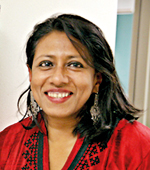Individual stories entwined in our post independence history
Ever thought that a saree pota (fall of a saree), maalu paan (fish buns), a teacup or a grinding stone could relate to the post-independence trajectory of our island nation? These familiar objects from our day-to-day existence are ‘transformed into deeply meaningful motifs of decisive junctures of the past 70-year journey of our nation’ in the Archive of Memory.

Dr. Malathi de Alwis
The brainchild of socio-cultural anthropologist Dr. Malathi de Alwis and museologist Hasini Haputhanthri, ‘The Archive of Memory- Reflections on 70 years of Independence’, calls for stories, linked to a treasured object, ordinary as it may be, in all three official languages of the country which, though personal experiences, reflect on the national history of post-independent Sri Lanka. The effort is inspired by the Memory Culture Project of the Historical Dialogue, supported by the GIZ, the German Agency for International Co-operation.
What this collection of ‘memories of national significance’ envisages is to give voice to a common history transcending ethnic, class, caste and religious boundaries. “With the ravaging civil war putting everything else into mere oblivion, it is very difficult for us to talk of a common history, to recollect a collective memory,” reflects Malathi, adding that the only common history we share in the post-independence phase is the World Cup Victory. The object-centric stories which the publication is soliciting do not necessarily have to be trauma-induced, says Malathi. “Although sadly some objects could be redolent of painful memories, people are most welcome to capture pleasant memories of independent
Sri Lanka.”
The whole idea of the publication is to give voice to a nuanced narrative of a common history and to offer an alternative place to start reflecting on the past, says Hasini. “Right now what we have is only a narrative or an official version which is being drummed into our heads through text books and scholarly work, it is not a nuanced narrative at all.” The archive is also expected to lend this common history ‘voice’ and ‘emotions’ adds Hasini. “The history we learn is completely emotionless. It is merely a record of dates and figures, whereas the narrative fragments the Archive of Memory is to offer, give life to a plethora of incidents and experiences and thereby create diverse shades of history.”

Hasini Haputhanthri
‘One day I was accompanying my mother to a parent-teacher meeting in school when she suddenly covered my eyes with her saree pota and asked me to pinch my nose tightly. It was a beautiful morning; the sun was shining and people were going about their routines but through her diaphanous, rose patterned saree pota, I glimpsed several young men burning on a pile of tyres. This was the first time I had seen anyone naked, let alone dead.’ Thus goes ‘saree pota’ one of the entries.
In ‘Fish Buns’ the writer is transported to the World Cup victory each time he sees these buns now. In ‘Swing’ the writer laments that he still cannot bring himself to make a swing for the two sons he has with his second wife, still haunted by the memories of the tsunami which took his first wife, his two children and his mother, sparing only the Suriya tree in his garden with a swing hanging from a branch.
Some of the writers remain anonymous and many accounts were originally narrated in Sinhala or Tamil, translated into English. “We want our contributors to feel comfortable in their chosen language and if anyone wishes to speak to us, we are most willing to interview and take down their stories,” says Malathi.
For 70 years of independence, 70 selected stories will be included in the book in all three languages along with images. A digital version will follow. The rest of the entries will be posted on a website. “Every story matters, so that it will be everyone’s history,” says Hasini.
The Archive, despite the editing certain stories require, also tries to retain the ‘voice’ of the speaker, Malathi explains, to enable ‘connectivity’. The book is to be launched at the end of this year in different parts of the island.
The Archive of Memory also hopes to be a bridge facilitating several other exercises, says Hasini. “If someone wants to produce a drama, a film, a documentary or any other creative there will be ample story lines within these narratives.”
Those who wish to share a story that is linked to a treasured object associated in some way with an important political, cultural, economic or historical moment in post independent Sri Lanka can get in touch with the team on:Archiveofmemory2018@gmail.com/ 0764521768/ Historicaldialogue.lk, 25, Elibank Road, Colombo 05.


